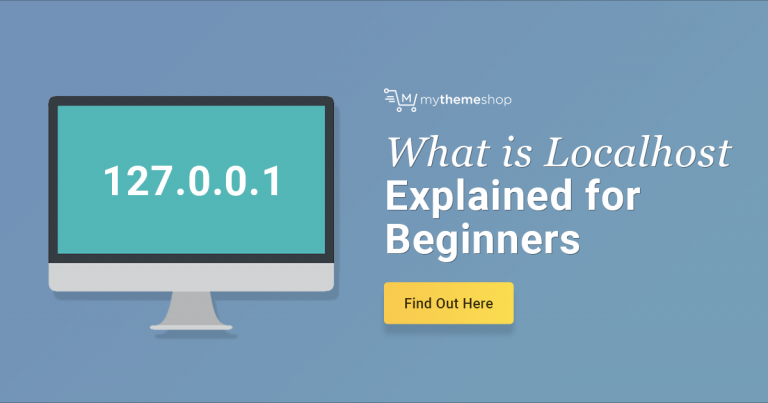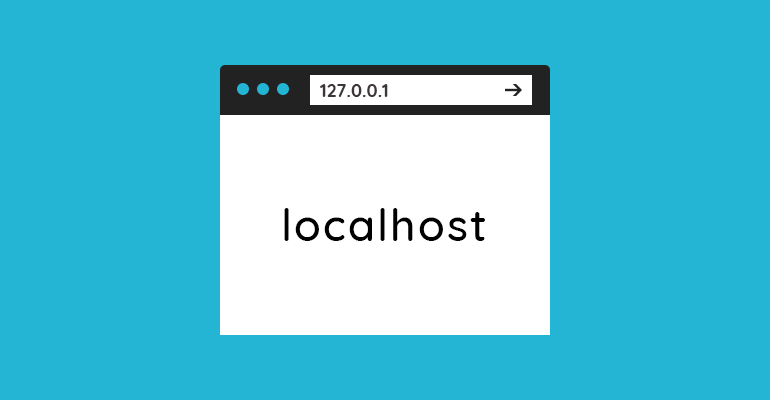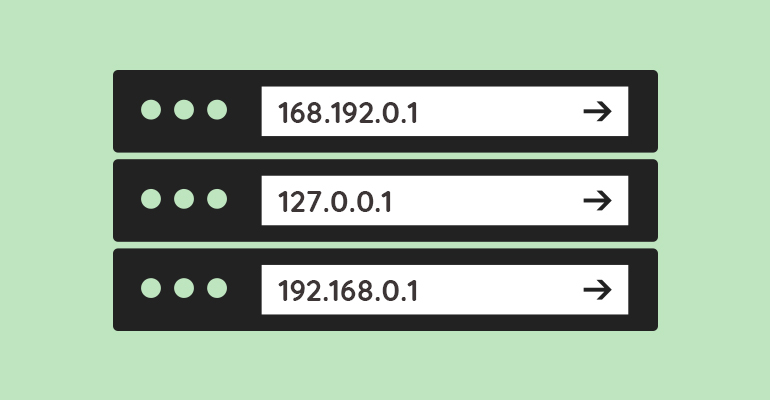
When discussing server management, data transfer, or networking, there are many technical terms that are used. It is easy to get confused.
“Localhost” is one of these terms. Stay tuned as we discuss localhost in detail.
The internet is an enormous network that operates under a specific set of rules. To view, download, or transfer any information to the internet, it takes a great deal of bandwidth.
Localhost is a term you must be familiar with. local machineThe home machine is a pattern like 127.0.0.1. The question to ask is: What does localhost do and how can it help you?
1 What Exactly Is localhost?
Let’s try to explain this using an example. Let’s say you are trying to connect to https://mythemeshop.com. This is a domain name Which is located in a particular area? IP address.

We connect to websites by using their URL. domain names (like mythemeshop) instead of their IP address due to the obvious reason – domain names are easier to remember as compared to an IP address like 192.0.2.1.
If you try to connect to 127.0.0.1 it will always connect with your system or, let’s say, your PC.
Localhost is simply your computer with a default IP of 127.0.0.1. When you try to connect to a computer or PC with the IP address 127.0.0.1, it will connect you directly to that computer.
Localhost is a server that your computer uses. The term is most commonly used when discussing networking.
2 What is the use of localhost?
You know that the internet requires a certain amount of bandwidth. Localhost was created primarily so that network engineers and developers could test their code on their local systems before releasing it to the internet or main server.

Imagine that we, at MyThemeShop, want to test a new design on our website. Before we launch the website, we need to be sure that all of the features in the new layout work perfectly. The payment gateway, download of files, and content structure, for example, should all work as expected after the implementation of the new design.
We would like to test the functionality of the theme before putting it live.
To test the same we can use the localhost, i.e. We can use our computer to test the theme’s functionality. Once all functionalities have been tested, the theme can be put live on the website.
This would enable us to seamlessly transition from the old design into the new design without breaking any functionality of our website.
Here are some knowledge bombs to help you get deeper into the information!
2.1 Localhost: More information
As a standard on computer networks, Localhost is an officially-reserved domain name for IP addresses.
The IP address is represented by four numbers ranging from 0 – 255.
If you use different browsers on different computers and try to change to the localhost, you’ll get different results. Say, for instance, that you have four computer systems. You can access localhost separately on each system. Each system will have a different result.
Why is it happening? The same internet resource may appear to be accessed, but the results can vary. Localhost is a loopback address which only refers to a local device.
You are referring the the localhost of a computer when you refer to it.
The internet is so well organized that IP 127.0.0.1 cannot be registered by any website. domain name On the Web. A unique range of IP address starts at 127. The IP addresses don’t exist at all on the WWW. They are unique addresses created exclusively on Local Area Networks.
3 How do I find my localhost Address?
In any computer network, localhost refers the computer where the program is being run. The computer serves as a server virtual. The computer here is not a real object but rather a virtual system. Consider “localhost”, as a method to “call” your PC.

So if you want to find your localhost address, just enter the IP address for it — this must be entered on the same computer from which the request is made. You can establish a connection with the address 127.0.0.1 and send information to server programs that are running on the same machine as the client software, regardless of how the network hardware is configured.
It is a good thing that you don’t require a network adapter, modem or any other type of communication equipment. The interface uses the pseudo device driver within the kernel of the OS.
4 What is the Difference Between 127.0.0.1 and Localhost?
What is the 127.0.0.1 address?
127.0.0.1 This is the most common loopback address. It contains over 16 million IP addresses which are used specifically for loopback functionality. The loopback address is used by your computer to communicate with itself via network connection protocols.
A loopback identifies a virtual networking device that establishes only one network endpoint. In other words, it is created on your computer.
What is meant by localhost? Localhost The communication port is described. This feature allows the network to loop back on itself. It can be used to simulate a network connection when one is not available or unavailable.
In use, and for discussion, the term localhost can be considered equivalent to 127.0.0.1. But it’s important to remember: The two are not exactly the same.
If the system is configured with default settings, the localhost URL in the URL gets converted to 127.0.0.1 (IPv4) or the IPv6 loopback mechanism of ::1. You can use many more loopbacks addresses for local hosting than just the two listed above. The range of IPs that are reserved for loopback address is 127.0.0.0 – 127.255.255.255.
What’s the difference between them? On most computers, 127.0.0.1 and localhost are identical in terms of functionality. The word localhost refers to the IP address and not the actual address. It can be directed to any IP address – even outside of the reserved block.
You may notice, when switching from Windows to Unix/Linux, that loopback is nearly synonymous with localhost. The hosts file can be used to redirect loopback to 127.0.0.1.
Localhost is a way to get 127.0.0.1. The two terms are synonymous. Also, here is a range of IP addresses that are designated to create local area networks: 127.0.0.1 – 127.255.255.255
5 What is the difference between localhost and port
In order to fully understand ports, it is necessary to first understand what they are.
On any computer, or host, or webserver, several different programs may be run simultaneously. TCP/IP (or Internet Protocol), uses different port numbers to address specific programs where everyone has the exact same address.
When the computer runs an HTTP server, such as Nginx, Apache, or Nginx, it will listen on port 80. It is not listening on port 8 if the computer is not running. You will get no response if you type localhost in port 80. The host would be accessible, but not respond.
Port numbers are commonly used by server programs. Many web applications don’t even specify the port number because they use the default port, which is port 80.
In principle, however, any service may be configured to run on any port. It is not possible to run multiple servers simultaneously on the same port.
6 Localhost is used for a variety of purposes
Localhost is a great service with three advantages.
Speed Test
As a network admin, you need to ensure that TCP /IP protocols work properly. Send a Ping request to localhost in order to perform a connection test. The test will let you know if it is all working properly or not. It will also allow you to rectify any issues.
Test Web Applications or Programs
The developers will benefit greatly from linking to localhost when creating a web app or program that needs an internet connection. As we’ve discussed, our operating systems becomes a simulated web server.
Then, you can upload all the program files on the server (local OS). check its performance Test the various features of your application before launching it on a server that could be accessed worldwide.
Sites B.Locking
Localhost can be used to block websites that you do not want other people to see. Loopback addresses are useful in preventing access to malicious websites or other unwanted content.
7 Final Thoughts
This was a very thorough post on localhost, and how to make the most of it. Localhost refers to your own computer that you can access through your web browser if you don’t know much about networking.
Please share your comments in the section below. We will be glad to answer your questions.